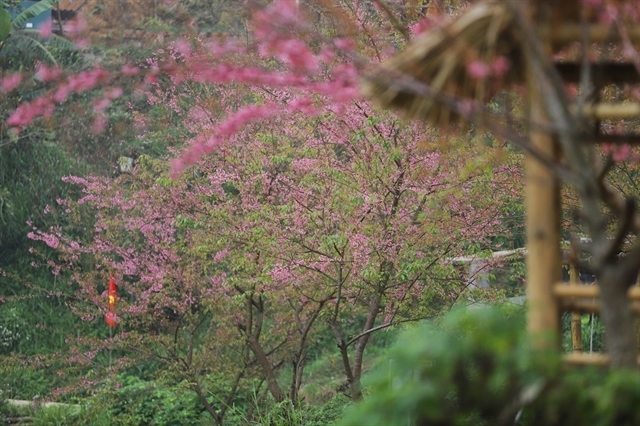 Features
Features

After spending hours teaching online, due to the pandemic, Ngô Minh Khôi uses his free time for creating pictures on small stones and glass bottles. He now has a particularly deep passion for mandala painting, which surprises many.
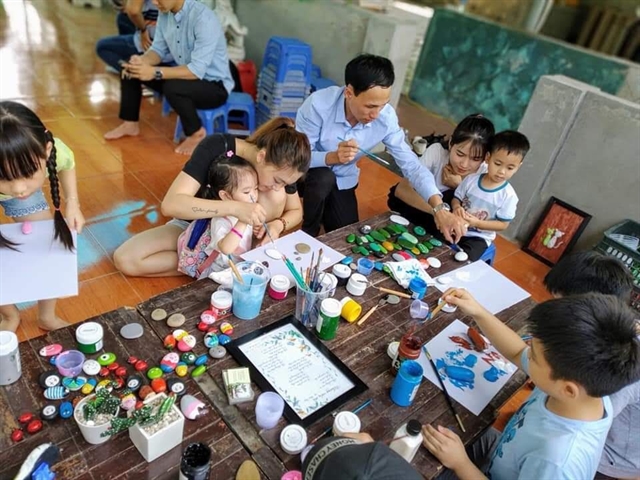
|
| Artist and teacher Ngô Minh Khôi tutors children and their parents on how to paint pebbles. Photo courtesy of the artist |
By Mai Phương and Khôi Nguyên
The coronavirus pandemic has affected the life of many in the creative art community.
Ngô Minh Khôi, 35, an art teacher at the Tô Hiệu Primary School in Hà Nội's Thường Tín District, has entertained his friends and pupils by introducing them to the beauty of painting on pebbles and glass during the pandemic.
After spending hours teaching online, due to the pandemic, Khôi then uses his free time for creating pictures on small stones and glass bottles. He now has a particularly deep passion for mandala painting, which surprises many.
Khôi said he accidentally found out about the art of painting on stones when watching a video on the internet about three years ago. He was so amazed at the magical beauty of the paintings on small rough pebbles that he started studying it himself.
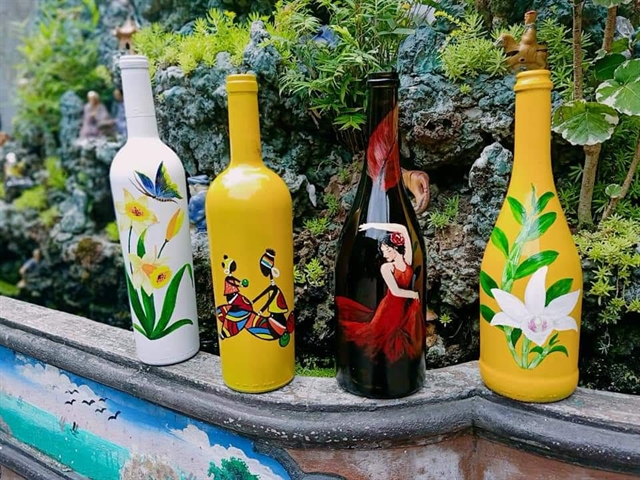
|
| Some of Khôi's paintings on glass bottles. -- Photo courtesy of the artist |
He believes the hobby of painting on pebbles is not strange but a trend for future generations, particularly in the era of COVID.
After graduating from the Central Art and Music Teacher Training College in 2007, for five years Khôi worked as a sketch painter for an embroidery enterprise in Chiến Thắng Village, a traditional craft village in the district of Thường Tín.
With the talent and experience he accumulated working in the embroidery workshop, he quickly adapted to the techniques used in mandala painting. However, when he first started painting on stones, Khôi faced many difficulties.
"Painting on stones is not like painting on paper and fabric. Pebbles are often small in size and are not easy to draw on, but require a very high degree of meticulousness," he said.
Moreover, in his native Thường Tín District, there was no source of pebbles so he had to take a bus to Long Biên District by the Hồng River to find and buy them.
Fortunately, it is now easier to get the stones since the art is booming with many people engaging in it, and many collecting pebbles to sell and turn a profit.
The process to complete a picture on a pebble or glass bottle is almost the same, going through several steps such as priming, sketching, drawing, drying and shading.
However, drawing on glass bottles is much more difficult than on pebbles because the grip on glass bottles is poor, demanding patience and care from the artists, according to Khôi.
With each pebble as small as a hand it takes an average of about three or four hours to complete a painting, he said.
Khôi said his most challenging work was a landscape of the typical Vietnamese countryside, including banyan trees, a water well and a courtyard. It took him about two days to finish.
Despite difficulties, his enthusiasm is growing and he uses all of his spare time to paint. His two children are also interested, often sitting next to him to watch him draw.
"That is really a great encouragement for me to keep on," he said. "At first studying painting on pebbles was just a curiosity. I wanted to explore another kind of art. When I finished my first works, I gifted them to relatives and friends on their birthdays and received compliments and encouragement from them," Khôi said.
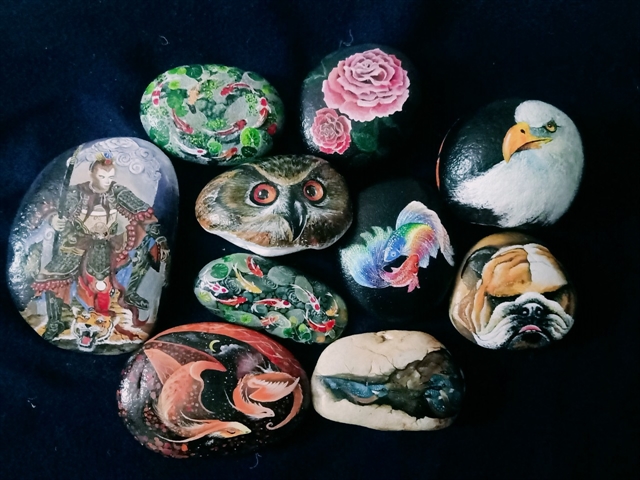
|
| Khôi breathes life into inanimate pebbles to turn them into beautiful works. -- Photo courtesy of the artist |
The artist was happy and tried to continue to perfect his craft so he could sell it at the market.
Through marketing on social networks and through the introduction of his friends, now, after more than two years, many of his works have won the favour of customers locally. He has even received many orders from customers in other cities and provinces.
Khôi said most of his products were sold for cafeteria decorations or used as decorative furniture items.
Mandala art
Along with painting on pebbles, Khôi is also developing his skills in mandala art, which has seen him make friends with people all over the world.
"I started engaging in mandala painting six months ago after spending some time studying it. I joined a group of international mandala artists and was accepted as a member after sending my work to the group," he said.
"Mandala art first appeared in 4th century India inside Buddhist monasteries. Buddhist monks created mandalas because the meditative process helped train their minds to become more enlightened."
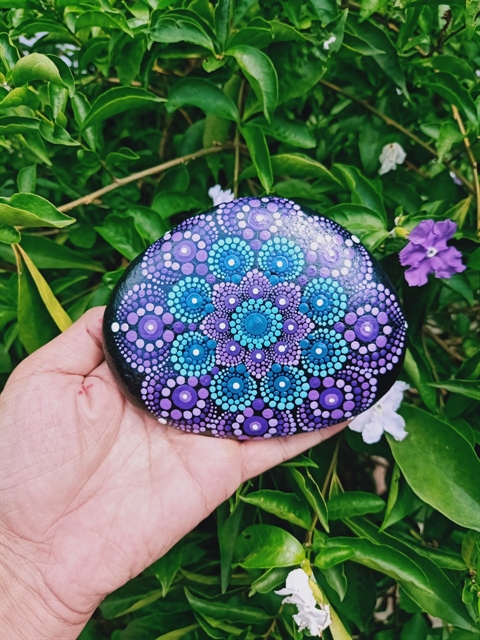
|
| A mandala work by Ngô Minh Khôi. -- Photo courtesy of the artist |
Today mandala art is a great activity for those looking to unwind through the artistic process.
The beauty of mandala painting goes beyond the mesmerizing colours and dots, and the technique has a rich history and is proven to relax the body and mind.
"All mandalas are circles contained within a square and arranged into sections that are organised around a single central point," he said.
"Working on a mandala demands much skill, enthusiasm and particularly persistence. But the more you paint, the more you feel relaxed and meditative."
He participated in an international online event “Festive Mandala Challenge” held last month by the Neha Creation organisation, and participants and organisers appreciated his contribution.
He is now running a mandala fan club, which has more than 100 members after just one month of operation.
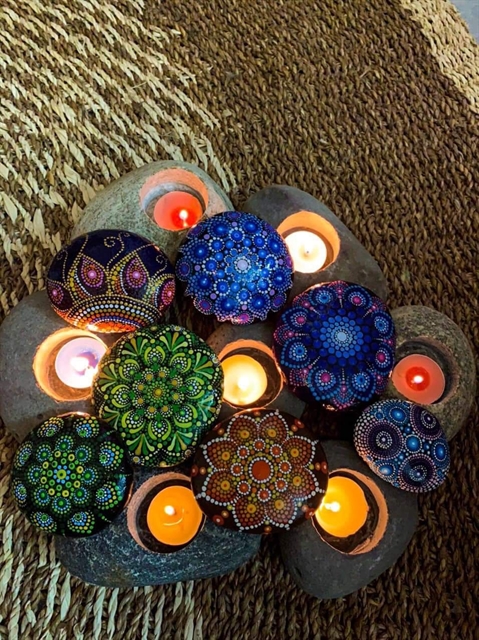
|
| Mandalas are circles contained within a square and arranged into sections organised around a single central point. -- Photo courtesy of the artist |
Khôi hopes to open a small enterprise to supply his art works to the market and create jobs for local people because customer orders have surpassed what he can create himself.
He also wants to open more classes, maybe online, about painting on pebbles for local children.
"Time is the same for everyone, but each will have his or her own way to consume it. Instead of letting the time during social distancing pass in vain, I want to make use of it to do meaningful things," he said. VNS
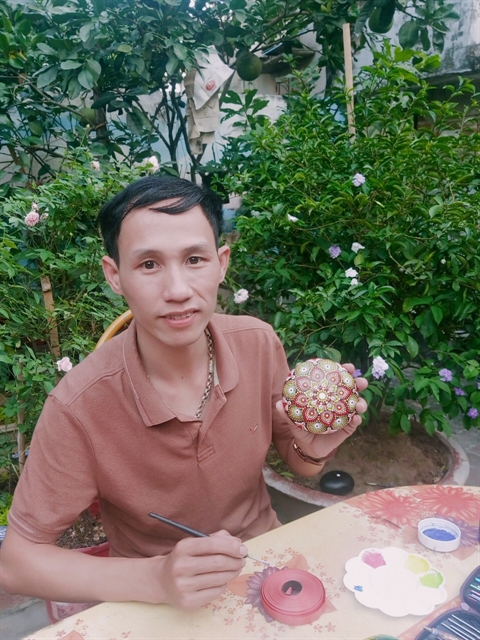
|
| Teacher-artist Ngô Minh Khôi. |